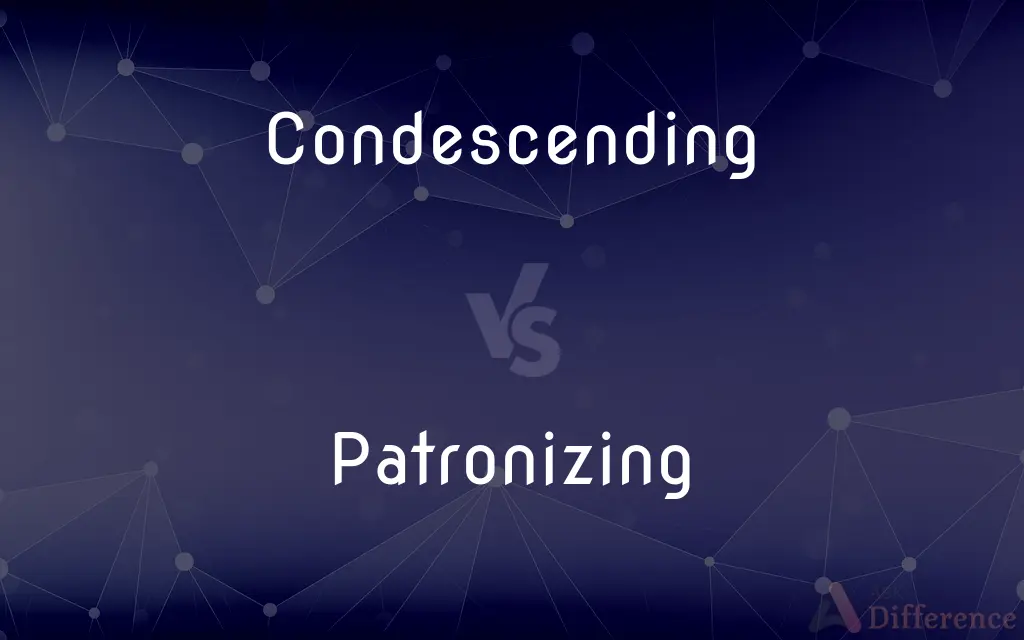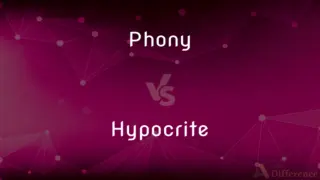Condescending vs. Patronizing — What's the Difference?
Edited by Tayyaba Rehman — By Fiza Rafique — Updated on September 21, 2023
"Condescending" refers to showing a feeling of superiority and looking down on others. "Patronizing" involves treating someone as if they're less intelligent or experienced.

Difference Between Condescending and Patronizing
Table of Contents
ADVERTISEMENT
Key Differences
"Condescending" is an adjective used to describe the act of displaying a sense of moral or intellectual superiority. This term often indicates that the person is looking down on others, believing they are somehow more valuable or important. It's as though the individual is doing others a favor by sharing their wisdom or insights.
In contrast, "patronizing" is a term that implies a subtle form of condescension where the individual may feign kindness or pretend to be on an equal footing, only to treat the other person as inferior. The patronizing individual often treats others as though they are less capable or less intelligent. Patronizing behavior often comes under the guise of 'helping' but leaves the recipient feeling belittled.
In essence, while both "condescending" and "patronizing" behaviors communicate a sense of superiority, they differ in the manner of execution. Condescending behavior is often more overt, and may not necessarily carry the pretense of being helpful or kind. Patronizing behavior, on the other hand, can be more insidious as it sometimes disguises itself as benevolent guidance.
"Condescending" is often used to describe a person's tone, language, or general attitude. It can manifest in numerous ways, from talking down to someone to giving unsolicited advice. "Patronizing" frequently appears in the form of 'helping' where help is neither wanted nor needed. The key distinction is that patronizing actions often appear kind at first glance but are rooted in a belief of the other's inferiority.
Comparison Chart
Definition
Showing a sense of superiority
Treating as inferior while feigning kindness
ADVERTISEMENT
Focus
Intellectual or moral superiority
Belittlement under the guise of help
Overt or Subtle
Usually overt
Usually subtle
Tone
May involve a superior tone
May feign an egalitarian tone
Prevalence in Speech
Often in tone and language
Often in actions and implied tone
Compare with Definitions
Condescending
Displaying a sense of intellectual or moral superiority.
His condescending tone made the meeting unbearable.
Patronizing
Disguising disdain or superiority as benevolence.
His patronizing compliments felt insincere.
Condescending
Treating others as if they are less important.
She found his condescending attitude offensive.
Patronizing
Treating others as if they are less capable or knowledgeable.
His patronizing manner made her feel incapable.
Condescending
Looking down upon others as inferior.
Her condescending smile said it all.
Patronizing
Feigning kindness while treating someone as inferior.
He was being patronizing when he said he liked her 'little project.'
Condescending
Carrying an air of disdain towards others.
His condescending comments ruined the conversation.
Patronizing
Offering unwanted help or advice.
She felt patronized when he explained basic concepts to her.
Condescending
Acting as if you are doing others a favor by your presence or advice.
He was condescending enough to give unsolicited advice.
Patronizing
Assuming an air of condescension disguised as kindness.
His patronizing tone made her question his intentions.
Condescending
Displaying a patronizingly superior attitude
"Wall Street's usual condescending attitude toward small investors" (Tom Petruno).
Patronizing
To act as a patron to; support or sponsor
Donors who patronize the orchestra.
Condescending
Assuming a tone of superiority, or a patronizing attitude.
Quit talking to me in that condescending tone! You always treat me like a child!
Patronizing
To go to as a customer, especially on a regular basis
We patronize the local diner.
Condescending
Present participle of condescend
Patronizing
To treat in a condescending manner, often in showing interest or kindness that is insincere
Felt she was being patronized by her supervisor.
Condescending
Exhibiting an attitude of superiority; patronizing; - used of behavior or attitude.
Patronizing
Offensively condescending.
Condescending
(used of behavior or attitude) characteristic of those who treat others with condescension
Patronizing
Present participle of patronize
Patronizing
Showing condescending favor; assuming the manner of airs of a superior toward another.
Patronizing
(used of behavior or attitude) characteristic of those who treat others with condescension
Common Curiosities
Is "condescending" overt or subtle?
It is usually more overt.
What does "patronizing" mean?
It means treating someone as inferior while feigning kindness.
Are the two terms interchangeable?
While similar, they are not fully interchangeable due to subtle differences.
What does "condescending" mean?
It means showing a sense of moral or intellectual superiority.
Is "patronizing" overt or subtle?
It is usually more subtle.
Is "condescending" always negative?
It is generally perceived as negative.
How do you avoid being "condescending"?
By being aware of your tone and treating others as equals.
Do both terms imply a belief of superiority?
Yes, both imply a sense of superiority, albeit executed differently.
Can "condescending" be used to describe tone?
Yes, it often describes a person's tone or manner of speaking.
Can "patronizing" be used to describe actions?
Yes, it often describes actions that demean under the guise of help.
Is "patronizing" always negative?
It is generally perceived as negative.
Can "condescending" appear in professional settings?
Yes, it often occurs in various settings including workplaces.
Can either term be used as a noun?
Yes, "condescension" and "patronization" are the respective nouns.
How do you avoid being "patronizing"?
By offering help only when it's asked for and treating others as capable.
Can "patronizing" appear in personal relationships?
Yes, it can occur in both personal and professional relationships.
Share Your Discovery

Previous Comparison
Phony vs. Hypocrite
Next Comparison
Reprehensible vs. IrreprehensibleAuthor Spotlight
Written by
Fiza RafiqueFiza Rafique is a skilled content writer at AskDifference.com, where she meticulously refines and enhances written pieces. Drawing from her vast editorial expertise, Fiza ensures clarity, accuracy, and precision in every article. Passionate about language, she continually seeks to elevate the quality of content for readers worldwide.
Edited by
Tayyaba RehmanTayyaba Rehman is a distinguished writer, currently serving as a primary contributor to askdifference.com. As a researcher in semantics and etymology, Tayyaba's passion for the complexity of languages and their distinctions has found a perfect home on the platform. Tayyaba delves into the intricacies of language, distinguishing between commonly confused words and phrases, thereby providing clarity for readers worldwide.














































